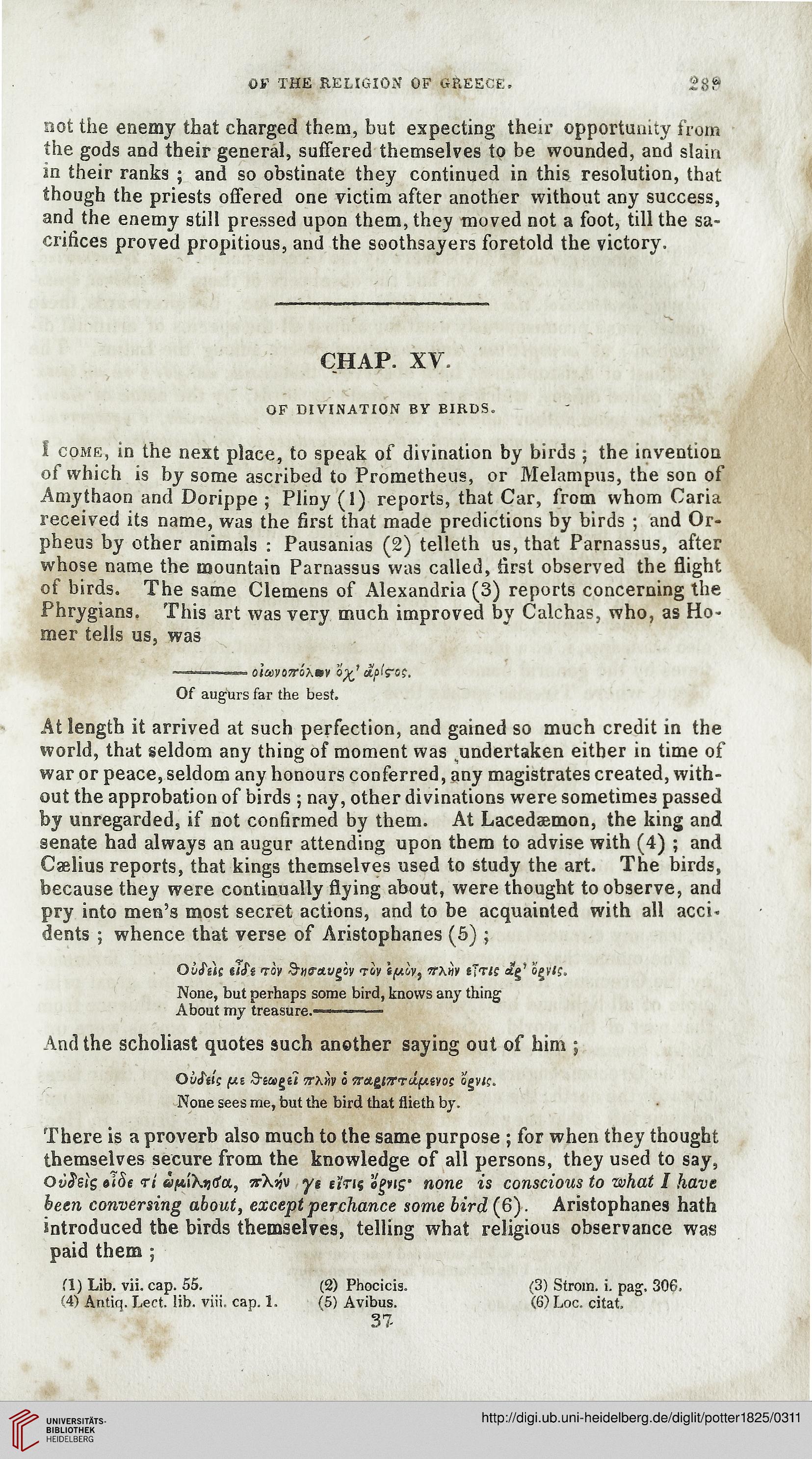ov the religion of greece.
not the enemy that charged them, but expecting their opportunity from
the gods and their general, suffered themselves to be wounded, and slain
in their ranks ; and so obstinate they continued in this resolution, that
though the priests offered one victim after another without any success,
and the enemy still pressed upon them, they moved not a foot, till the sa-
crifices proved propitious, and the soothsayers foretold the victory.
CHAP. XV.
of divination bv biros.
I come, in the next place, to speak of divination by birds ; the invention
of which is by some ascribed to Prometheus, or Melampus, the son of
Amythaon and Dorippe ; Plioy (1) reports, that Car, from whom Caria
received its name, was the first that made predictions by birds ; and Or-
pheus by other animals : Pausanias (2) telleth us, that Parnassus, after
whose name the mountain Parnassus was called, first observed the flight
of birds. The same Clemens of Alexandria (3) reports concerning the
Phrygians. This art was very much improved by Calchas, who, as Ho-
mer tells us, was
- oiwviTroxmv o^'a^ro?.
Of augurs far the best.
At length it arrived at such perfection, and gained so much credit in the
world, that seldom any thing of moment was undertaken either in time of
war or peace, seldom any honours conferred, any magistrates created, with-
out the approbation of birds ; nay, other divinations were sometimes passed
by unregarded, if not confirmed by them. At Lacedaemon, the king and
senate had always an augur attending upon them to advise with (4) ; and
Caelius reports, that kings themselves used to study the art. The birds,
because they were continually flying about, were thought to observe, and
pry into men's most secret actions, and to be acquainted with all acci«
dents ; whence that verse of Aristophanes (5) ;
Oiifitt uS% Toy ^xa-augsy tov ty.1v) vxirt sTt/j <*§' ogv/c.
None, but perhaps some bird, knows any thing
About my treasure.
And the scholiast quotes such another saying out of him ;
None sees me, but the bird that flieth by.
There is a proverb also much to the same purpose ; for when they thought
themselves secure from the knowledge of all persons, they used to say,
OvS'slg »l8t ti afJiXktjda, jtAjjv yt eirii egvis' none is conscious to what I have
been conversing about, except perchance some bird {&) ■ Aristophanes hath
introduced the birds themselves, telling what religious observance was
paid them ;
(l) Lib. vii. cap. 55. (2) Phocicis
(4) Antiq. Lect. lib. viii. cap. 1. (5) Avibus.
37-
(3) Strom, i. pag. 306.
(6) Loc. citat.
not the enemy that charged them, but expecting their opportunity from
the gods and their general, suffered themselves to be wounded, and slain
in their ranks ; and so obstinate they continued in this resolution, that
though the priests offered one victim after another without any success,
and the enemy still pressed upon them, they moved not a foot, till the sa-
crifices proved propitious, and the soothsayers foretold the victory.
CHAP. XV.
of divination bv biros.
I come, in the next place, to speak of divination by birds ; the invention
of which is by some ascribed to Prometheus, or Melampus, the son of
Amythaon and Dorippe ; Plioy (1) reports, that Car, from whom Caria
received its name, was the first that made predictions by birds ; and Or-
pheus by other animals : Pausanias (2) telleth us, that Parnassus, after
whose name the mountain Parnassus was called, first observed the flight
of birds. The same Clemens of Alexandria (3) reports concerning the
Phrygians. This art was very much improved by Calchas, who, as Ho-
mer tells us, was
- oiwviTroxmv o^'a^ro?.
Of augurs far the best.
At length it arrived at such perfection, and gained so much credit in the
world, that seldom any thing of moment was undertaken either in time of
war or peace, seldom any honours conferred, any magistrates created, with-
out the approbation of birds ; nay, other divinations were sometimes passed
by unregarded, if not confirmed by them. At Lacedaemon, the king and
senate had always an augur attending upon them to advise with (4) ; and
Caelius reports, that kings themselves used to study the art. The birds,
because they were continually flying about, were thought to observe, and
pry into men's most secret actions, and to be acquainted with all acci«
dents ; whence that verse of Aristophanes (5) ;
Oiifitt uS% Toy ^xa-augsy tov ty.1v) vxirt sTt/j <*§' ogv/c.
None, but perhaps some bird, knows any thing
About my treasure.
And the scholiast quotes such another saying out of him ;
None sees me, but the bird that flieth by.
There is a proverb also much to the same purpose ; for when they thought
themselves secure from the knowledge of all persons, they used to say,
OvS'slg »l8t ti afJiXktjda, jtAjjv yt eirii egvis' none is conscious to what I have
been conversing about, except perchance some bird {&) ■ Aristophanes hath
introduced the birds themselves, telling what religious observance was
paid them ;
(l) Lib. vii. cap. 55. (2) Phocicis
(4) Antiq. Lect. lib. viii. cap. 1. (5) Avibus.
37-
(3) Strom, i. pag. 306.
(6) Loc. citat.




